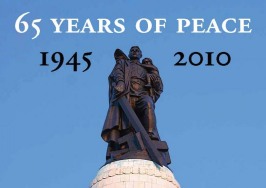4 May 2010, the European Parliament, Brussels
Dear Members of the European Parliament, Excellencies, dear colleagues and friends,
The forthcoming 65th anniversary of the end of World War II is an event of major significance for all countries in the world. For our country, as President Dmitry Medvedev repeatedly emphasized, the date of Victory over Nazism is sacred. It brings very joyous, bright and at the same time very bitter memories. And the memory of World War II remains today very important.
May 9, 1945 will forever remain the closing day of the greatest tragedy of the 20th century. In commemorating this day we pay tribute to the great deeds of our ancestors, to the spiritual force with which the peoples of the world defended their right to freedom, to independence, to live, to raise children and grandchildren, and to pass on to them the spiritual values and traditions that have animated our nations for centuries.
I thank honourable MEPs Alfreds Rubiks and Jiri Maštalka for organizing this important exhibition and selecting photographs that depict the major events and aspects of the war.
his exhibition reminds us of all deprivation that the people of the world -and primarily the peoples of the USSR - suffered. It reminds of the brutal 900-day blockade of Leningrad, of the terrible battles of Moscow and Stalingrad, of the Battle of the Kursk Bulge and of the heavy fighting for the liberation of Europe.
People on these photos changed the course of world history. Their spiritual strength and devotion helped them to prevail on the long and difficult path to victory. They gave the gift of life and liberty to future generations. And all the power of the Nazi war machine was powerless against them. We are all deeply indebted to those who died in the war.
I would like to emphasize the decisive contribution of the Soviet people to the victory over Nazism. It was the Soviet Union – with its expanses, towns and villages – that absorbed the brunt of the Nazi invasion. Three fourths of German armed forces were defeated on the Eastern Front, including the most combat-capable, battle-hardened units. It was the peoples of the USSR who at the cost of their lives, enormous sacrifices and the destruction of their cities preserved the greater part of the material heritage of European civilization.
That is why the victory in this terrible war is part of the common spiritual heritage of all peoples of the former Soviet Union. Not only did our fathers and grandfathers uphold our freedom, and save the Motherland, but they also made a decisive contribution to the liberation of Europe from Nazi enslavement.
We are also grateful to the Allies in anti-Hitler coalition, in particular for the opening of the second front in 1944 and for the supply of arms and food, for the Lend-Lease programme. These supplies allowed the Soviet Union to survive the first and hardest period of the war and this was of course an important contribution to victory.
The very creation of the anti-Hitler coalition is rightfully considered a major diplomatic breakthrough of its time. It represented an unprecedented example of states with different ideologies and political systems rallying in the face of a mortal threat hanging over mankind. Its participants were able to rise above their differences for the sake of the overriding aim – to crush the common enemy and achieve Victory, one for all. The opponents of Nazism were united by an understanding that evil must be resisted by all means, in a spirit of solidarity and mutual trust.
World War II really is a great example for all peoples and a great lesson of the 20th century. The consequences of this tremendous historical drama had the most direct influence on the course of world history, including the development of international relations. Six and a half post-war decades have utterly transformed the entire world and our nation as well. But still the victory over Nazism is a lesson that is relevant today, when once again there are those who are interested in rewriting history in order to achieve their own political goals.
I am convinced that new generations of Europeans must know how much blood and tears were shed during this period and that May 1945 gave us not only the great joy of victory, but also a heavy responsibility for the fate of mankind. The peoples of the world, and above all the peoples of the Soviet Union, paid a very high price for Victory. That is why we so dearly want a peaceful future for our planet, why we value human life and important principles of international security.
I express again my gratitude to the organizers of this exhibition and hope that it will contribute to a better understanding of the lessons of history and thus to creating a more stable and peaceful Europe.























